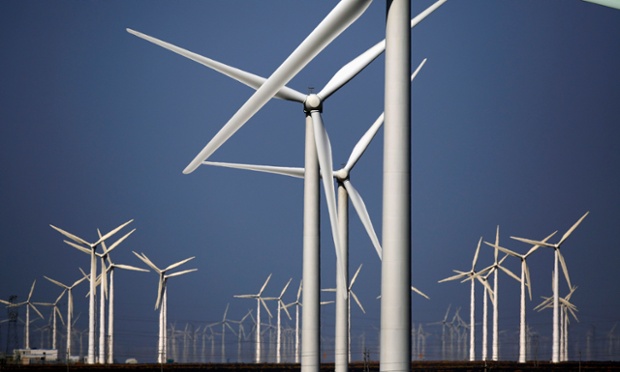Are we reaching a positive climate change tipping point?
Despite low oil prices, the latest figures reveal a striking turnaround in solar and wind power investment, but are we really about to win the carbon war?
Are we tipping the right way? One of the great environmental stories is of how catastrophe can creep up and be noticed only when it is too late to act. Examples range from the sudden, inexplicable collapse of bee colonies, to ice cores revealing the potential for dramatic climatic upheavals that happen not in millennia or centuries, but the time it takes to pass through a coalition government or two.
It is hard enough to identify tipping or “inflection” points when you are consciously looking, like monitoring the so-called known unknowns of future forest die-back, deep-sea methane release, ice melt and sea level rise. Worse, in complex systems, are the unknown unknowns. All you have is nebulous worry. It’s why we are supposed to obey the precautionary principle relating to any activity which at scale is capable of altering whole systems.
But this is only half the story, because when something tips, it might well fall to the floor and smash but it might also fall comfortably into your lap. It’s possible we have become so hypnotised by real and serious negative tipping points, that we’ve forgotten that things can turn out unexpectedly well too.
While fish populations and financial markets might suddenly collapse around their complacent human overseers, iron curtains and regimes can fall with just as little warning. Societies can dramatically change course to take collective responsibility, cancel each others’ debts, care for each other and pull together in the face of great challenges. All the political parties in the UK election are fighting over the future of the NHS. It emerged dramatically as a bold new social commitment to mutual care in the immediate shadow of financial market failure and years of brutal conflict. At its weakest point the UK took its boldest step. Beneath the surface, the experience of those years had changed people, making big change possible, acceptable and desirable.
Now, in spite of everything, are we approaching just such a positive inflection point in the face of climate change?
The latest figures on renewable energy trends from the UN Environment Programme (Unep) reveal a striking turnaround after a period in which low oil prices and policy uncertainty pushed investment down, threatening the sector. Even though oil prices remain low, world investment, largely in solar and wind, went up by 17% to $270bn (£180bn) last year, reversing a two-year dip. The new generating capacity that represents is about the same as the total output of the current US nuclear system.
One reason the sector is defying a normally brutal, simple market logic around price is because bigger shifts are happening in the investment world.
“There’s a quiet revolution going on,” says Nick Robins, co-director of the Unep Inquiry into a Sustainable Financial System (pdf), “with central banks and financial regulators starting to incorporate sustainability into their core activities”. For example, “In China, there’s growing momentum for building a ‘green financial system’ to tackle the country’s serious environmental problems,” he says.
It explains the confidence with which China, already the world’s largest wind power user, plans within five years to have more than double the capacity of the whole of Europe. It also colours the new, upbeat China-US climate diplomacy and is far from an isolated example.
Costa Rica may have relied on its very particular topography to have its energy system powered 100% by renewable energy in 2015, but it is symbolically powerful and Costa Ricans are enjoying falling energy prices. Also, the best energy systems should always be locally tailored.
Under very different circumstances, the district of Rhein-Hunsrück in the industrial giant of Germany achieved 100% renewable status and exports surplus clean energy to the grid. The €290m (£213m) it used to spend on importing energy is being turned into value for the local community by an energy system based on efficiency and local, renewable sources.
Solar entrepreneur Jeremy Leggett argues in his forthcoming book, The Winning of the Carbon War, that three mostly independent dynamics are at play driving the change. Firstly, the numbers no longer add up in the old fossil fuel model. The costs of new acquisitions become unmanageable in a system that feasts on debt. Secondly, costs in solar and the vital link of a green energy system, battery storage, are plummeting while the sector offers attractive, reliable rates of return to investors. The Swiss bank UBS famously predicted the rapid “extinction” of the old fossil fuel system as battery costs as much as halve over the next five years.
And, finally, there is movement internationally on climate policy. “We are now in danger of winning the carbon war,” says Leggett. ”Would I like to be running an oil company now? Defending their case is becoming untenable.”
Some politicians seem timid, however, and reluctant to let go of the sector to turn over a clean sheet. As momentum for divestment from fossil fuels gathers pace, Chris Smith, the Labour peer, former chief of the Environment Agency and now chair of a task force on shale gas, recently said that “leaving all fossil fuels in the ground is for the fairies”. As ever in politics it is the signal here that matters.
Campaigners argue that what should be left in the ground is the amount which science suggests is unsafe to burn. But his “slow down, hold on a moment” message was echoed by the shadow secretary of state for energy, Caroline Flint, who did “not support divestment” from fossil fuels, merely investing more in clean energy. It comes with the familiar cry of needing to live in the real world, in which living in the real world actually requires ignoring what it takes to maintain the real world’s life support mechanisms. But these are people being dragged, reluctantly along by larger forces over which they have ultimately little control.
One in four UK homes now benefits from wind power, a rise of 15% on last year, and Scotland is generating enough clean energy to be used in 98% of its homes.
There is an area of the southern African Cape that for large parts of the year is arid and grey. Then when the rains fall on the scrub of the western Cape the earth erupts with life in an extravagant flowering that is one of the world’s great natural wonders.
Progress and beauty can hide just beneath the surface of events, and be just as socially contagious as the darker side of humanity. What tips us one way or the other is how we choose to act. The great change today may be as simple as the shift from asking what we can do for the environment, to seeing what the environment can do for all of us.
Source: www.theguardian.com

